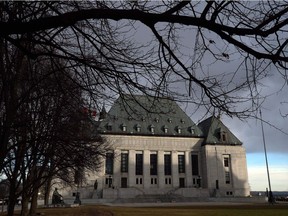Ryder: Finally, Canada is taking the politics out of Supreme Court nominations

Article content
The changes to the appointment process for Supreme Court of Canada judges announced by the prime minister Tuesday are important steps forward. An already strong court will be even stronger in the future.
Our process of Supreme Court appointments is firmly rooted in the 19th century: The Governor General appoints the judges on the advice of the prime minister. A few attempts to upgrade this process based on untrammelled executive discretion have been made, but they have not endured.
Other countries, most notably the United Kingdom a decade ago, have brought their processes for appointing judges into the 21st century. It’s high time Canada did too.
Until now, partisan politics infiltrated every stage of what should have been a merit-based process. Appointees should have been chosen because they were the best equipped and most fearlessly committed to upholding the rule of law and the Constitution. But the process has been so hidden and unaccountable we’ve had no way of knowing whether that was the case. Judges might have been chosen because their views aligned closely with those of the prime minister or other members of Cabinet. That hovering suspicion is damaging to the status and legitimacy of the court.
We should applaud the announced changes because now any qualified candidate may apply and be considered, not just those on a short list compiled by the government.
Most importantly, we should applaud the changes because now an independent advisory board, rather than a committee dominated by members of Parliament from the ruling party, will determine which candidates go forward.
The new advisory board will be composed of seven members appointed for terms of up to five years: four appointed by different branches of the legal profession, and three by the government. The advisory board will review applications and put forward a short list of three to five candidates for the prime minister’s consideration. The prime minister is not legally bound to select a nominee from the advisory board’s short list, but no doubt will. MPs will then have an opportunity to question the nominee prior to his or her appointment.
Tuesday’s announcement included documents describing the mandate and composition of the advisory board, and the qualifications and criteria the board will consider when assessing applicants. Functional bilingualism is now a prerequisite, which makes perfect sense for a court that hears arguments in English and French. Other qualities are well-articulated in the document, including knowledge of Canada’s common law, civil law and indigenous legal traditions, empathy and the moral courage to make decisions at odds with the stated wishes of government or public opinion.
The advisory board is directed to consider the institutional needs of the court, and to ensure that the members of the court are reasonably reflective of Canada’s diverse society.
Absent from this initiative is any mention of the convention of regional representation on the court. By law, three of the court’s nine judges are drawn from the Quebec bench and bar. By convention, three more judges are from Ontario, and one each is from British Columbia, the Prairies and the Atlantic provinces. This convention is an important expression of the federal principle. Yet there is no indication that the government expects the advisory board to adhere to it. As far as the common law provinces are concerned, the advisory board is designed to function nationally, without representation relating to the province or region to which a vacancy by convention relates.
The government recognizes that the new process is not perfect and will evolve. The advisory board will file a public report after each appointment that may contain recommendations for improvements. Recognizing the convention regarding the court’s composition and strengthening provincial representation on the advisory board should be among them. Strengthening representation from indigenous organizations should be another.
Whatever the future holds, the changes have put us on a promising path that will limit partisan influence on future appointments and strengthen the court’s role as an independent arbiter of the rule of law and the Constitution.
Bruce Ryder is a professor specializing in constitutional law at Osgoode Hall Law School, York University.
(Editor’s note: This column has been updated to clarify the length of terms advisory board members may serve.)






Postmedia is committed to maintaining a lively but civil forum for discussion. Please keep comments relevant and respectful. Comments may take up to an hour to appear on the site. You will receive an email if there is a reply to your comment, an update to a thread you follow or if a user you follow comments. Visit our Community Guidelines for more information.